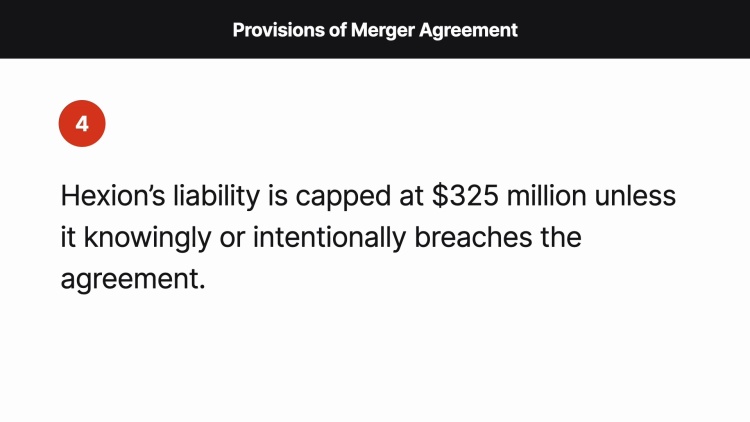Hexion Specialty Chemicals, Inc. v. Huntsman Corp.
Delaware Court of Chancery
965 A.2d 715 (2008)
- Written by Rose VanHofwegen, JD
Facts
Hexion Specialty Chemicals, Inc. and its parent company (plaintiffs) entered a merger agreement to acquire Huntsman Corporation (defendant) for about $10 billion. Eager to beat out other bidders, Hexion agreed to no financing contingency, meaning Hexion would not be excused from performing even if the financing it had negotiated with banks fell through. Instead, the agreement required Hexion to use best efforts to consummate the merger and not do anything that might interfere with its financing. The agreement allowed Hexion to cancel only if a material adverse event (MAE) occurred that decreased Huntsman’s ability to do business as a whole. However, a liquidated-damages provision capped Hexion’s liability at $325 million unless Hexion knowingly or intentionally breached the deal. Shortly after signing the agreement, Huntsman reported disappointing earnings, and Hexion began looking for ways to back out. Hexion hired a business valuation firm to provide an opinion that the combined entity would be insolvent after the merger, then released news to the media that the deal would not close. Meanwhile, the banks that had agreed to financing withdrew it. Hexion sued asking the court to declare that Huntsman had suffered an MAE, allowing Hexion to cancel, or in the alternative, that Hexion was not liable for more than $325 million in liquidated damages. Huntsman counterclaimed requesting specific performance.
Rule of Law
Issue
Holding and Reasoning (Lamb, J.)
What to do next…
Here's why 908,000 law students have relied on our case briefs:
- Written by law professors and practitioners, not other law students. 47,100 briefs, keyed to 997 casebooks. Top-notch customer support.
- The right amount of information, includes the facts, issues, rule of law, holding and reasoning, and any concurrences and dissents.
- Access in your classes, works on your mobile and tablet. Massive library of related video lessons and high quality multiple-choice questions.
- Easy to use, uniform format for every case brief. Written in plain English, not in legalese. Our briefs summarize and simplify; they don’t just repeat the court’s language.





